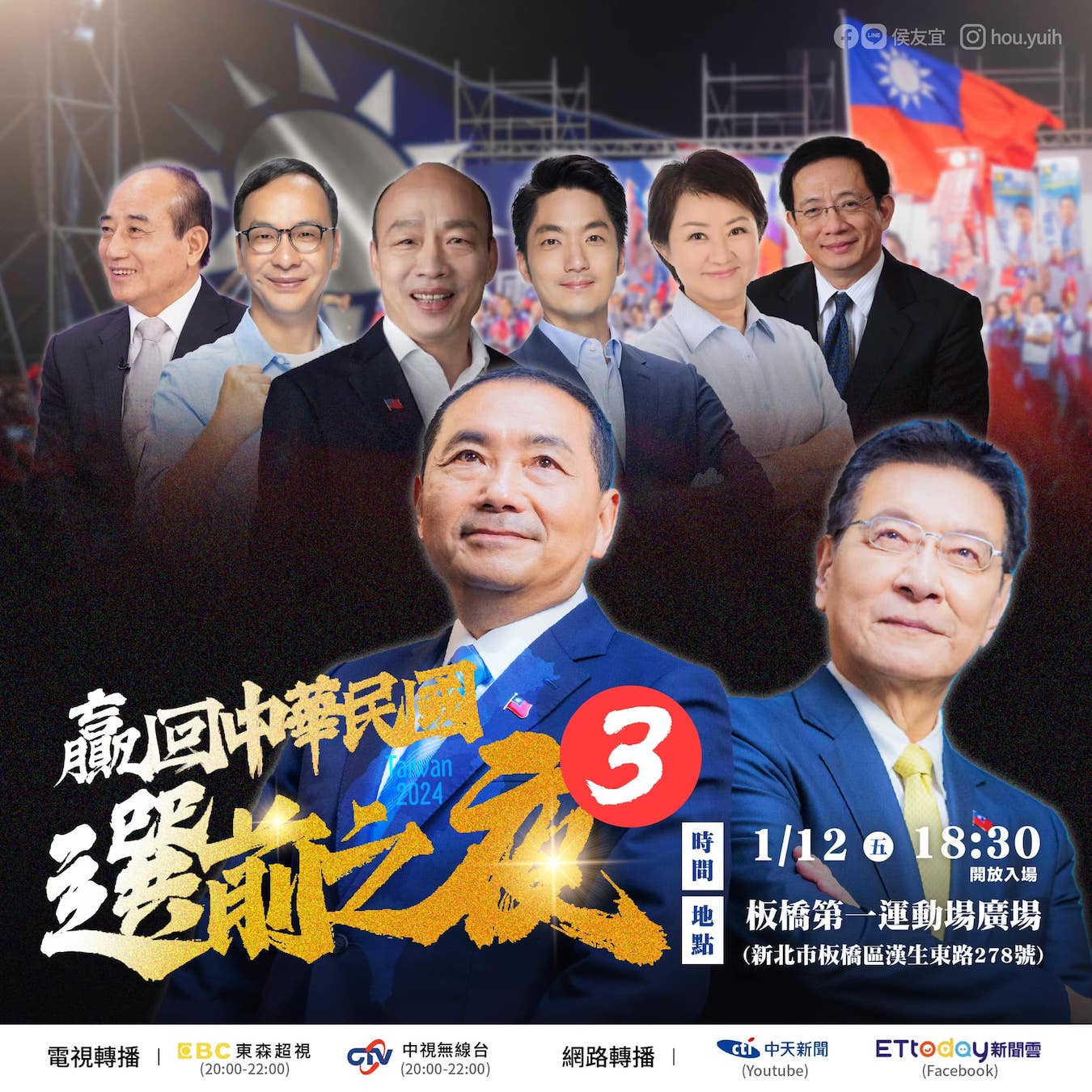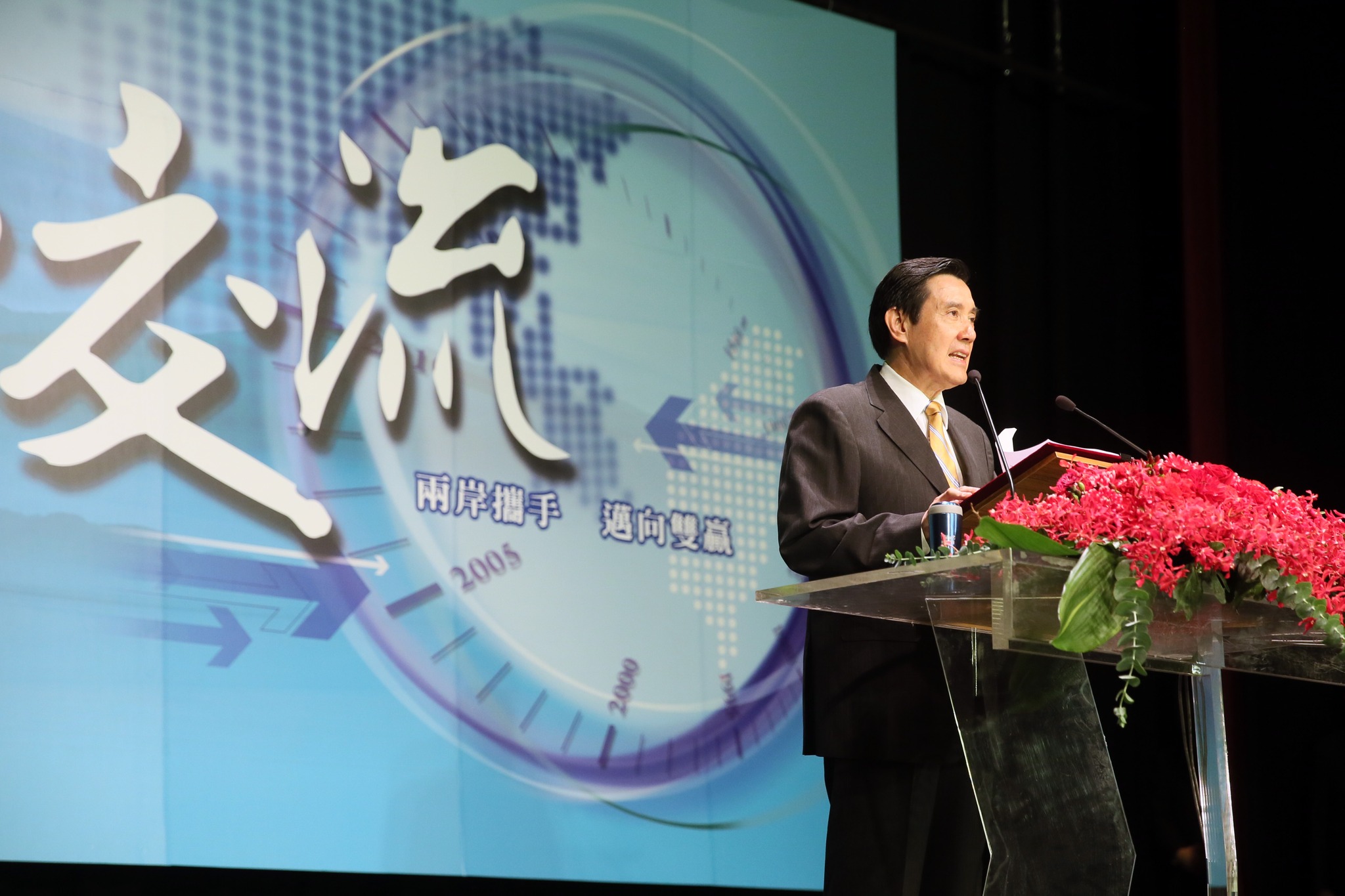by Brian Hioe
語言:
English
Photo Credit: Ma Ying-jeou/Facebook
COMMENTS BY FORMER president Ma Ying-jeou in an interview have presented a last-minute hurdle for the Hou campaign in the last few days.
In comments to German public broadcaster Deutsche Welle in an interview released on Wednesday, Ma made a number of questionable comments. Ma claimed that he believed the people of Taiwan would gradually accept unification if it were gradual and peaceful. Nevertheless, he claimed that Taiwan could never win a war with China, as a result of which Taiwan should cut its military budget. To this extent, Ma called for “faith in Xi Jinping”, and sought to cast doubt on the reliability of the US as an ally in the event of a Chinese invasion, stating that the US would never get involved.
The fallout was immediate. KMT presidential candidate Hou You-yi quickly sought to distance himself from Ma, stating that he had different views than Ma. Later on, it was announced that Ma would not be invited to the KMT’s final major rally before the election takes place on Saturday.
 KMT campaign poster. Photo credit: Hou You-yi/Facebook
KMT campaign poster. Photo credit: Hou You-yi/Facebook
This proves an ironic twist. Ma has been a commanding presence in the KMT in the last few years. His significant role in the party was highly evident in the failed negotiations between the TPP and KMT about a joint ticket, in which he and KMT chair Eric Chu presided over the acrimonious series of events that led the prospect of a joint ticket to fall apart, even if Ma did not take an active role in trying to push for a ticket and seemed fine with a joint ticket regardless of who fronted it.
In particular, Ma has emerged to stymie attempts at changing the KMT’s pro-China image and swerving from policies tied to his political legacy. For one, given the unpopularity of the 1992 Consensus at present, successive KMT chairs such as Johnny Chiang and Eric Chu have suggested dropping it. However, Ma has emerged to challenge any suggestion of dropping the 1992 Consensus each time this came up.
Hou himself initially did not commit to the 1992 Consensus in campaigning, though he stressed that he respected Ma’s views on the matter. Later on, with Hou failing to mobilize the KMT party base, he eventually committed to the idea as well as traditional platforms of the KMT such as nuclear power.
It is probable that Ma also played a role in the KMT’s return to advocacy for the Cross-Strait Services Trade Agreement (CSSTA) and its current calls for maintaining the Economic Cooperation Framework Agreement in the face of Chinese threats to end this provision. To be sure, the notion of reviving the CSSTA was first proposed in this election cycle by Ko Wen-je of the TPP, but Ma likely played a role in the KMT also committing to the idea, seeing this as an opportunity to double down on his political legacy. After all, the CSSTA was opposed during the Ma administration with the outbreak of the 2014 Sunflower Movement, and still smarting from the slight—the emergence of one of Taiwan’s largest social movements in history against the bill, as a youth-led movement—Ma may see an opportunity to finally push through the CSSTA.
 Former president Ma Ying-jeou. Photo credit: Ma Ying-jeou/Facebook
Former president Ma Ying-jeou. Photo credit: Ma Ying-jeou/Facebook
With Ma out, it is to be seen whether this benefits the Hou campaign or hurts it. Hou now has more control over his messaging, particularly on cross-strait issues, without Ma seeking to interfere with his platform. Hou can use Ma’s comments to double down on his claim to adhere to the moderate stance of opposing both One Country, Two Systems, as a hardline pro-unification position, and Taiwanese independence.
But it may be too late in the election cycle for this to make much difference, as this occurs in the last few days before voting. Voters may not be convinced of Hou and the KMT’s earnestness, seeing as Ma clearly played an important role in the KMT’s campaigning with his frequent appearances at rallies right up until controversy over the interview. Even as Hou has publicly sought to reemphasize that he would not push for independence, that Hou’s campaign also contains historically staunchly pro-unification hardliners such as his vice presidential candidate, Jaw Shaw-kong, undermines the claim that Ma’s views are particular to him. Instead, Ma’s comments will undermine You’s attempts to frame himself as a pro-status quo politician, accentuating views of the KMT as covertly pro-unification.

